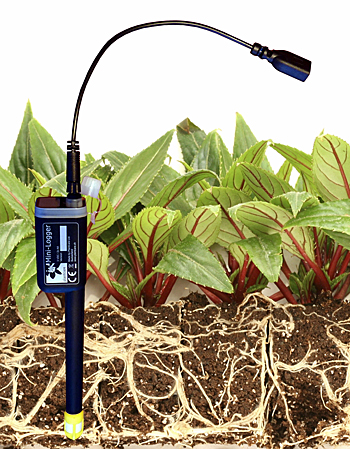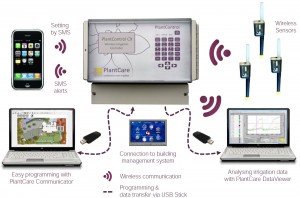A Swiss company, PlantCare Ltd., has developed the first self-learning irrigation system, called PlantControl CX, that uses a wireless network, 60 soil sensors and a central computer to manage the amount of moisture distributed to plants in a field. The system is programmed to know the water needs of each plant based on growth stage, seasonal temperature fluctuations and time of day. The system then automatically releases just the right amount of water. When deployed it learns to adjust the rate and length of watering between irrigation cycles to create optimal growth in field crops.
PlantCare is preset to cover up to 32 different irrigation zones and adjusts water input automatically without human intervention. The end result for PlantCare customers, today in Switzerland, Germany, Austria, the Netherlands and Turkey, are improved crop yields, reduced insect and weed infestations, and the elimination of leaching of fertilization and pesticide chemicals into local aquifers because of over irrigation.
In the past farmers would traditionally rely on self knowledge about field and moisture conditions and determine when to irrigate. The results could be very uneven with farmers watering when soil moisture levels didn’t require it, or the opposite, not watering when the plants begin to be distressed from sudden drought.
The PlantCare technology isn’t limited to monitoring the soil. It also can notify a farmer when mechanical components in the irrigation network fail such as a pump or valve. The farmer then receives a short-text messages (SMS) on his or her smartphone through PlantCare’s wireless communication system. The PlantCare network can manage fields spread over a 30 kilometer (18.6 mile) radius. Where permanent irrigation systems are not installed PlantCare can be used to monitor and dispatch mobile irrigation systems to fields where soil moisture levels indicate the need.
One of PlantCare’s clients can’t say enough about the impact the technology has had on his berry farm:
“With the PlantControl CX we increased the yield on our berry crops like never before. In addition, our time consumption for operating and controlling our irrigation and fertilization system has been reduced by more than 90%. At the same time water as well as fertilizer consumption were reduced and the plants are much more resistant against pest and fungus.”










